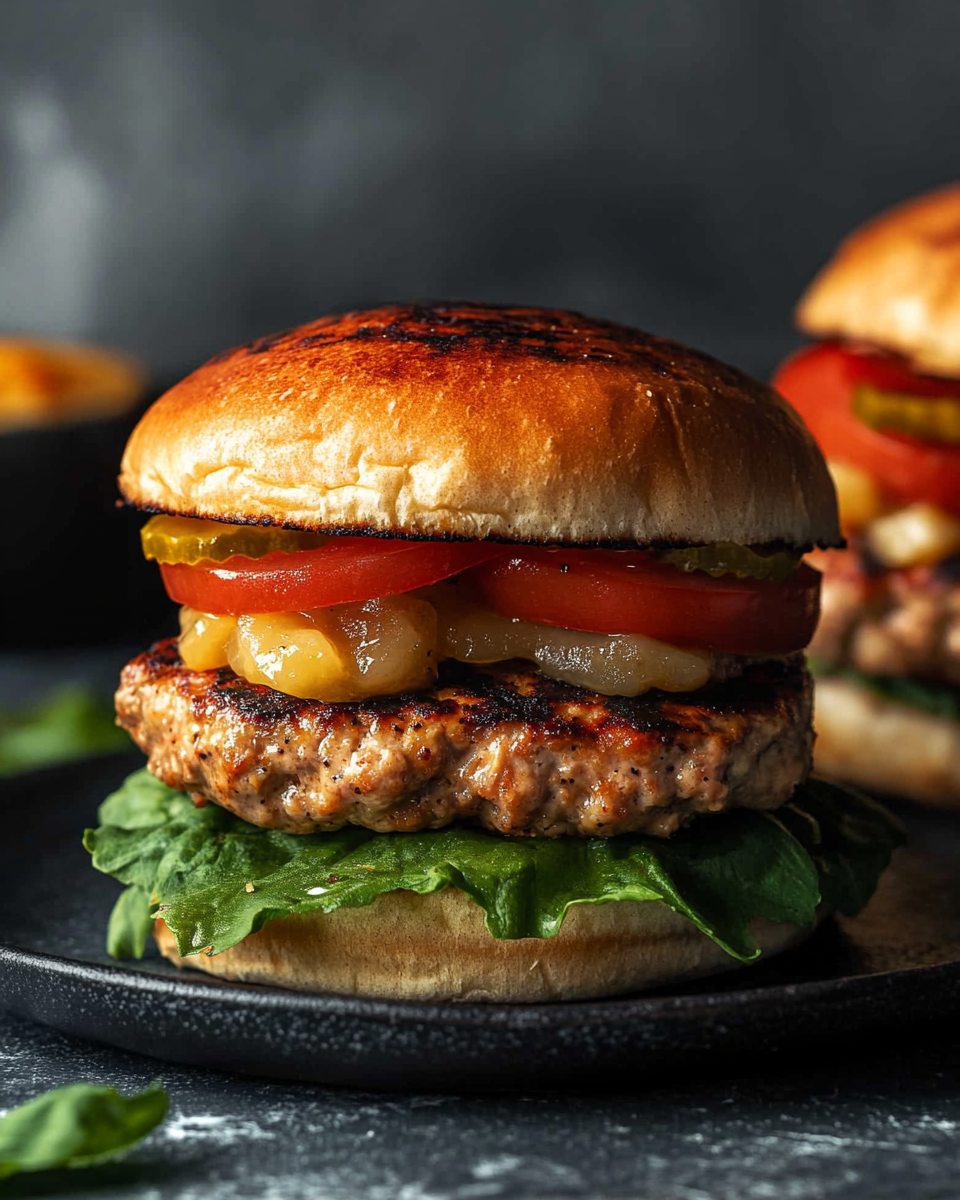A healthier alternative to traditional beef burgers, these grilled turkey burgers are juicy, flavorful, and perfect for summer cookouts. With simple seasonings and a quick prep time, they’re a delicious and lean option for lunch or dinner.
FULL RECIPE
Ingredients
- 1 1/4 lbs ground turkey (preferably 93% lean)
- 1/4 cup finely chopped onion
- 1 garlic clove, minced
- 2 tablespoons chopped fresh parsley
- 1 tablespoon Worcestershire sauce
- 1 teaspoon Dijon mustard
- 1/2 teaspoon salt
- 1/4 teaspoon black pepper
- 4 whole wheat burger buns
- Optional toppings: lettuce, tomato slices, red onion, pickles, mustard, ketchup
Directions
- Preheat the grill to medium-high heat.
- In a large bowl, combine the ground turkey, onion, garlic, parsley, Worcestershire sauce, mustard, salt, and pepper.
- Mix gently until just combined. Do not overwork the meat.
- Form the mixture into 4 equal-sized patties.
- Lightly oil the grill grates and place the patties on the grill.
- Cook for 5–6 minutes per side, or until the internal temperature reaches 165°F.
- Toast the burger buns on the grill for 1–2 minutes if desired.
- Assemble the burgers with your preferred toppings and serve immediately.
Nutritional Information
- Calories: 300 per burger (without toppings or bun)
- Protein: 28g
- Fat: 14g
- Carbohydrates:5g (without bun)
- Fiber: 1g
- Sodium: 400mg
Health Benefits of Grilled Turkey Burgers
Grilled turkey burgers offer a nutritious alternative to traditional beef burgers by providing lean protein with less saturated fat. Turkey is rich in essential nutrients such as B vitamins, selenium, and zinc, which support metabolism, immunity, and overall health. Choosing turkey over red meat can help lower cholesterol levels and reduce the risk of heart disease while still delivering a satisfying and protein-packed meal.
Why Choose Ground Turkey for Burgers
Ground turkey is a versatile and healthier option because it contains fewer calories and fat compared to beef. It has a mild flavor that easily absorbs seasonings, making it adaptable for a variety of tastes. Additionally, lean ground turkey supports muscle maintenance and repair, making it ideal for active lifestyles and weight management plans.
The Importance of Seasoning in Turkey Burgers
Proper seasoning is crucial to elevate the naturally mild taste of turkey. Ingredients like garlic, onion, Worcestershire sauce, and mustard not only enhance flavor but also add layers of complexity and moisture to the patties. Without adequate seasoning, turkey burgers can turn out bland or dry, so balancing spices is key for a juicy and flavorful result.
Grilling Tips for Perfect Turkey Burgers
Grilling turkey burgers requires attention to temperature and timing to avoid dryness. Using medium-high heat and monitoring the internal temperature to reach 165°F ensures the patties are cooked safely while remaining juicy. Lightly oiling the grill grates prevents sticking and helps achieve those appealing grill marks that add texture and taste.
Comparing Turkey Burgers to Beef Burgers
While beef burgers are often favored for their rich flavor, turkey burgers provide a leaner alternative with fewer calories and less saturated fat. Turkey burgers are slightly lighter in texture but can be just as satisfying when cooked properly and paired with flavorful toppings. They offer a great way to enjoy a classic favorite with a healthier twist.
How to Keep Turkey Burgers Moist
Because turkey is lean, it’s important to add ingredients that help retain moisture. Incorporating chopped onions, a touch of oil, or even grated vegetables like zucchini can keep the burgers juicy. Avoid overmixing the meat, as that can make patties dense and dry. Cooking to the right temperature and not beyond is essential for moisture retention.
Best Buns for Turkey Burgers
Choosing the right bun can enhance the overall burger experience. Whole wheat buns add fiber and nutrients, complementing the lean protein of turkey. Lightly toasting the bun on the grill provides a pleasant crunch and prevents it from becoming soggy from burger juices or condiments. Alternatives like lettuce wraps work well for lower-carb options.
Popular Toppings for Turkey Burgers
Turkey burgers pair well with a variety of toppings. Fresh vegetables like lettuce, tomato, and red onion add crunch and freshness. Pickles provide tang, while condiments such as mustard or low-fat mayonnaise contribute creaminess. Cheese, such as Swiss or cheddar, can add richness, but lighter options help keep the meal balanced.
Incorporating Herbs and Spices
Using fresh herbs like parsley or cilantro brightens the flavor and adds an aromatic quality. Spices such as paprika, cumin, or chili powder can introduce warmth and depth. Experimenting with different herbs and spices allows you to customize turkey burgers to fit your preferred flavor profile, from Mediterranean to Southwestern styles.
Turkey Burgers for Weight Management
Because they are lower in fat and calories, turkey burgers are an excellent choice for those managing their weight. High in protein, they help promote satiety and preserve lean muscle mass. Combined with whole grain buns and plenty of vegetables, turkey burgers can be part of a balanced, calorie-conscious meal plan.
How to Store and Reheat Leftover Turkey Burgers
Cooked turkey burgers should be stored in airtight containers in the refrigerator and consumed within three days to ensure safety and freshness. When reheating, using a microwave or skillet over low heat helps maintain moisture. Avoid overheating as it can dry out the patties, diminishing taste and texture.
Turkey Burgers as a Family-Friendly Meal
Turkey burgers are generally well-accepted by all ages due to their mild flavor and customizable toppings. They make a quick and nutritious meal for families, providing a good source of protein without heavy fats. Kids often enjoy assembling their own burgers, which can encourage healthier eating habits.
Gluten-Free and Allergy Considerations
For those with gluten sensitivities or allergies, turkey burgers can easily be adapted by swapping traditional buns for gluten-free options or lettuce wraps. Seasonings should be checked to avoid gluten-containing additives. This flexibility makes turkey burgers an inclusive meal for various dietary needs.
Pairing Sides with Turkey Burgers
Complement turkey burgers with nutrient-rich sides like salads, roasted vegetables, or sweet potato fries. These options boost fiber and vitamins while keeping the meal balanced. Light, fresh sides contrast well with the warm, savory burger and make for a well-rounded plate.
The Environmental Impact of Turkey vs. Beef
Choosing turkey over beef has a smaller environmental footprint. Turkey production generally requires less water and land and emits fewer greenhouse gases. Making this switch contributes to more sustainable eating habits and reduces the impact on natural resources.
Creative Variations of Turkey Burgers
Turkey burgers can be customized in numerous ways, including adding cheese into the patty, mixing in chopped vegetables, or experimenting with international spices. Adding ingredients like sun-dried tomatoes, olives, or feta cheese can give the burgers a Mediterranean flair, while curry powder or ginger can introduce Asian-inspired notes.
Turkey Burgers for Meal Prep
Turkey burgers are ideal for meal prepping because they can be cooked in batches and stored for quick meals throughout the week. They reheat well and maintain flavor when stored properly. Preparing a variety of toppings and sides ahead of time simplifies weekday lunches or dinners.
The Role of Protein in Turkey Burgers
Protein is essential for muscle repair, immune function, and overall energy. Turkey burgers provide a high-quality source of lean protein that supports these bodily functions. Including turkey burgers in your diet helps meet daily protein needs while keeping fat intake moderate.
Cooking Safety Tips for Turkey Burgers
Since ground turkey can harbor bacteria if undercooked, it’s important to use a food thermometer to confirm the internal temperature reaches 165°F. This ensures safety without compromising the texture or flavor. Proper handling and cooking practices prevent foodborne illness.
Cultural Popularity of Turkey Burgers
Turkey burgers have gained popularity worldwide as consumers seek healthier alternatives to traditional fast food. They are a staple in many American households and restaurants, appreciated for their balance of flavor and nutrition. Their adaptability has also made them popular in various fusion cuisines.
Conclusion
Grilled turkey burgers offer a delicious, nutritious, and versatile meal option that fits well into modern lifestyles focused on health and convenience. Their lean protein content, combined with the ability to customize seasonings and toppings, makes them appealing to a wide range of tastes and dietary preferences. With careful preparation and thoughtful accompaniments, turkey burgers can be both satisfying and wholesome, making them an excellent addition to any meal rotation.






